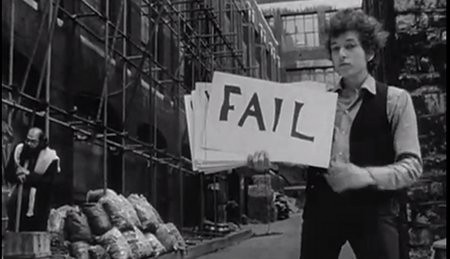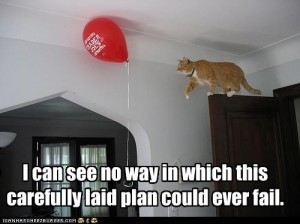A kitchen-sink post on failure
Yesterday was the International Day for Failure, which I heard about via the Library Loon and various others on Twitter. I’d been mulling this post for about a week, and I was going to actually write the thing yesterday so as to be timely, but, well, I kinda failed at that. It was prompted by several conversations at THATCamp New York 2012 last weekend, among other things. (Warning for epic length as well as references to epic fails.)
1. Failing in public
We’re all familiar with the dismissive use of “FAIL.” But what if we were to take it differently, not as a dismissal but as a place to start over in a different way? At THATCamp, one of the projects on exhibit was CUNY’s Journal of Interactive Technology and Pedagogy, which, to my vast delight, includes an entire section devoted to “Teaching Fails.” Similarly, a just-begun “academic failblog” with the glorious name of Fumblr aims to be a space for “sharing those moments of tripping on the cracks with a community, and opening up the conversation about process rather than simply focusing on product.” All of which is very much in the process-oriented, communal, learn-from-your-mistakes spirit of THATCamp, and of the digital humanities community more broadly.
There were also some very interesting conversations at THATCamp about opening up “middle-state” research, the kind of research that’s not yet in a publishable state but that might benefit from more openness than in-progress academic work usually gets. We got to see a nifty project, Archive Notebook (created by Jane Greenway Carr at NYU and Cecily Swanson at Cornell), which showcases unused “scraps” of archival research. As they put it, they’re interested in preserving
the digital presentation of scholarly errata, the unused detritus of our research that strays and swerves like the 21st century archive itself. … With this online forum, we ask: what happens if we refuse to let these artifacts and specimens slip from our fingers unnoticed? What if instead, we project them outward into a community wider and broader than ourselves?
I find all this immensely encouraging. In the old days of blogging, the Michael Gormans and Ivan Tribbles of the world would periodically wag a stern finger in academic and library bloggers’ faces: Stop putting half-baked ideas out there where anyone can see them! Stop expressing opinions! Stop being so informal! Stop, for God’s sake, revealing that you are an imperfect human being with (HORRORS!) a personality! Needless to say, the finger-wagging didn’t really stop anyone from using the open, informal, back-and-forth blog format to talk about either the library profession or the academic one. And one of the best things about that format is that it fosters spaces where not every thought is polished within an inch of its life, where messy early-stage thinking gets shared, where failure can be explored in the spirit of doing it better next time.
2. Shame, vulnerability, impostor syndrome
There was a time in my life when it would have done a lot for my mental health to hear some upfront discussion of “teaching fails.” From 1999 to 2004, I taught first-year college writing. By my own standards, and probably by objective standards as well, I was rubbish at it. It was years ago and I’ve since gotten a lot better at teaching, so I can say it now: I failed often, back then. I still feel bad for the students who didn’t learn as much about writing as they could have because their instructor was an awkward, inexperienced, desperately insecure, excruciatingly self-conscious ball of nerves. During the worst of the grad-school years, as I was floundering as a teacher, with the academic job market looming ahead and promising many new and exciting opportunities to screw up, I had a constant inner monologue of I’m a failure, I’m a failure, I’m a failure. (Until finally — I still don’t quite know how — I stopped accepting that inner voice as the Unquestioned Oracle of Truth and started to ask how accurate it was.)
I was desperate not to let the failure, any failure, show. My prose style in those early seminar papers had a weird, artificial, lacquered quality, like I was (unconvincingly) trying to channel the gravitas of someone much older and more learned. I was trying to do that in the classroom, too. The result was that some part of me was always standing aside, worrying about how I looked in other people’s eyes: whether my students were judging me,* whether the Invisible Committee of Academics in the Sky (or future hiring committees, or current mentors) thought I was good enough. In short, I was in danger of turning into Mr. Casaubon from Middlemarch:
It is an uneasy lot at best, to be what we call highly taught and yet not to enjoy: to be present at this great spectacle of life and never to be liberated from a small hungry shivering self — never to be fully possessed by the glory we behold, never to have our consciousness rapturously transformed into the vividness of a thought, the ardor of a passion, the energy of an action, but always to be scholarly and uninspired, ambitious and timid, scrupulous and dim-sighted.
– George Eliot, Middlemarch,** chapter 29
That small hungry shivering self: I wanted to get rid of it entirely. It embarrassed me. (Whenever I try to remember this passage verbatim, my memory insists on adding “naked” to that string of adjectives.) Couldn’t I just be someone else? Someone bulletproof, invulnerable? But, of course, trying so hard to hide that hungry shivering self made it impossible to be free of it, impossible to enjoy the great spectacle.
I suppose this is inevitable in a culture where status is based on knowledge but there’s also so much more to know than any one person can possibly manage to learn in a lifetime. Impostor syndrome runs rampant. People adopt a steely outer shell. As Scicurious put it in this brilliant post about impostor syndrome and underdog narratives:***
running, and sports in general, LOVE underdogs. We love to hear heroic tales of people who overcame great odds, who suffered staggering defeat, and then who worked hard, pushed themselves, and made it. … We love to hear about underdogs in sports, in media, in literature. But one place you’ll never hear about them? Science. Academia. No one ever introduces a great speaker with “I’ve known so and so for a really long time, and they’ve always been a great scientist. Even in the dark days when the grants kept getting rejected and we had to play poker in the lab because we were out of money, they never lost their love of science!”. … Academia makes you project confidence, in the face of all odds. Of COURSE you got it funded. Of COURSE you knew you were going to get a position. Of COURSE. To show lack of confidence is to be weak, to be unprofessional, even to be…unsuccessful.
3. Modeling failure
A couple of summers ago I went to ACRL Immersion, a week-long workshop for librarians who teach. On one of the first days, we talked about the “authentic teacher” concept from Parker Palmer’s The Courage to Teach, and this passage from the first chapter leaped out at me:
We lose heart, in part, because teaching is a daily exercise in vulnerability. … To reduce our vulnerability, we disconnect from students, from subjects, even from ourselves. We build a wall between inner truth and outer performance, and we play-act the teacher’s part.
– Parker Palmer, The Courage to Teach (San Francisco: Jossey-Bass, 1998), chapter 1
It seems obvious in retrospect — of course it’s hard to teach well when all one’s energy is going into projecting a made-up persona to keep from feeling vulnerable — but, at the time, it was like the proverbial lightbulb going on. I didn’t have to perform Invulnerable All-Knowing Sage on the Stage! I didn’t have to repress every sign of personality! I didn’t have to freak out if something went wrong!
So one of the things I now try to do when I teach is to model productive failure. When I’m in front of a group of students talking about research strategies, I don’t always have everything planned; I do live searches, which sometimes lead nowhere; I demonstrate what doesn’t work and explain why it doesn’t work; I try to roll with it when there are technical difficulties. I’m trying to show them that some degree of failure is part of every research project. There will always be sources they can’t get to, promising ideas that turn out to be blind alleys, approaches that have to be scrapped. There will always be moments when they feel stymied and frustrated, and it’s better for all concerned if they can move past the paralyzing fear that all failures are terrible, life-ending, and impossible to recover from.
(One of my pedagogical role models is Ginger Rogers teaching Fred Astaire to dance. Complete with the pratfall at the end, although not with the line about how nobody could teach him to dance in a million years.)
I have no grand conclusion to this, really, except to say that most of life takes place in the space between the extreme poles of “EPIC WIN” and “EPIC FAIL,” but it’s entirely too easy to see all failures, or even anything short of EPIC WIN, as occupying the EPIC FAIL side of the scale. Even when the failures are not at all epic. (Lyric fail?) And with that I’ll leave you, as is only appropriate, with a lolcat.
* This was a frequent theme of my recurring teaching anxiety dreams. I still remember the dream where I was trying to reassure a student that the class wouldn’t always be so boring, and then I looked down and realized I’d forgotten to put on a shirt before coming to class.
** I came late to Middlemarch, but I think it’s going to be in my Top Five Favorite Novels of All Time Ever list for a long time. Not least because every time the narrator gets into Casaubon’s head, I think “There but for the grace of God go I.”
*** Seriously, read the whole thing.
Comments are closed.


